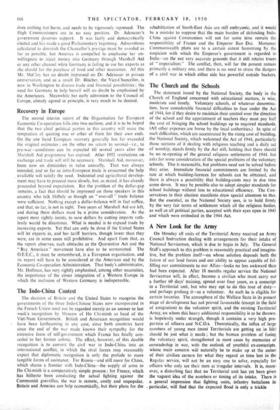The Indo-China Contest
The decision, of Britain and the United States to recognise the governments of the three Indo-Chinese States now incorporated in the French Union need not be regarded merely as an answer to last week's recognition by Moscow of Ho Chi-mink as head of the Viet-Nam Government. British and American recognition would have been forthcoming in any case, since both countries have since the end of the war made known their sympathy for the extensive form of self-government which France has finally con- ceded to her former colony. The effect, however, of this double recognition is to convert the civil war in Indo-China into an international conflict, in which the rival forces may reasonably expect that diplomatic recognition is only the prelude to more tangible forms of assistance. For Russia—and still more for China, which shares a frontier with Indo-China—the supply of arms to Ho Chi-minh is a comparatively simple process ; for France, which has hitherto been conducting the actual fighting against the Communist guerrillas, the war is remote, costly and unpopular. Britain and America can help economically, but their plans for the
rehabilitation of South-East Asia are still embryonic, and it would be a mistake to suppose that the main burden of defending Indo- China against Communism will not for some time remain the responsibility of France and the Emperor Bao Dai. Moreover Commonwealth plans are to a certain extent hamstrung by the suspicion with which the Emperor's government is regarded in India—on the not very accurate grounds that it still retains traces of " imperialism." The conflict, then, will for the present remain primarily a military one, and there is no need to stress the dangers of a civil war in which either side has powerful outside backers.


































 Previous page
Previous page